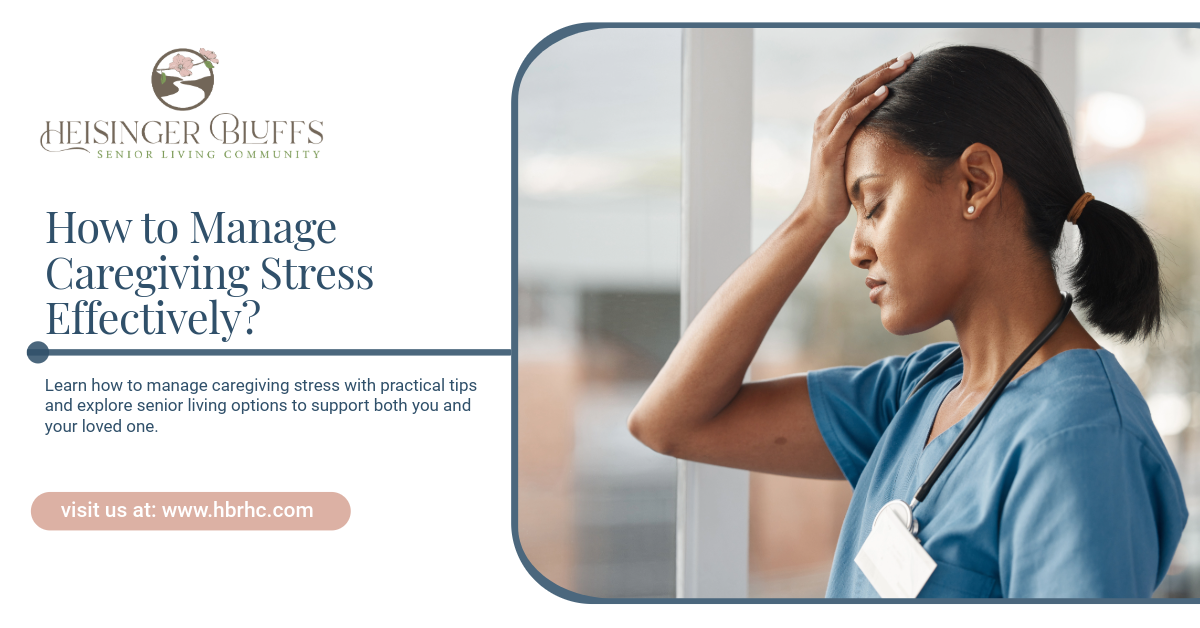Recognizing Signs of Depression or Anxiety in Seniors

Depression or Anxiety in Seniors
As our loved ones age, they often experience changes in their physical and emotional well-being. While it's normal for seniors to face challenges like health issues, it's important to recognize when these challenges might signal something more serious, such as depression or anxiety. Mental health is just as crucial as physical health, and depression and anxiety can significantly impact the quality of life for older adults.
Understanding the signs and symptoms of these conditions in seniors is vital. Many seniors might not openly express how they feel, making it difficult for family members and caregivers to spot potential issues. This blog aims to help you recognize signs of depression and anxiety in seniors, as well as offer ways to support them during difficult times.
What Is Depression in Seniors?
Depression in seniors is more than just feeling sad. It's a persistent feeling of hopelessness, loss of interest, and a lack of energy that can last for weeks or even months. It can stem from various factors, including physical health problems, isolation, the loss of loved ones, or the transition into retirement or assisted living.
Depression is not a normal part of aging, but it is common. Unfortunately, many seniors don't seek help because they assume it’s something they just have to live with, or they might not even realize they’re experiencing depression. Therefore, being vigilant about the signs is crucial.
Common Symptoms of Depression in Seniors:
- Persistent Sadness: A feeling of emptiness or sadness that doesn’t seem to go away.
- Loss of Interest: Seniors may lose interest in hobbies or activities they once enjoyed.
- Fatigue or Low Energy: Even after a full night’s sleep, seniors might feel constantly tired or sluggish.
- Sleep Changes: Either sleeping too much or struggling with insomnia.
- Appetite Changes: Either overeating or loss of appetite, leading to weight gain or loss.
- Irritability or Restlessness: Seniors may become more easily frustrated or agitated.
- Difficulty Concentrating: A lack of focus, which might make daily tasks seem overwhelming.
- Physical Ailments: Headaches, stomach problems, or unexplained aches and pains.
- Thoughts of Death: In severe cases, depression can lead to suicidal thoughts. This requires immediate intervention.
Causes of Depression in Seniors:
The causes of depression in older adults can vary and often result from a combination of factors, including:
- Chronic Illnesses:Long-term health issues, such as diabetes, heart disease, or cancer, can contribute to feelings of sadness and hopelessness.
- Medication Side Effects: Some medications can lead to depressive symptoms as a side effect.
- Grief: The loss of a spouse, friend, or other loved one can cause deep sadness, which might eventually develop into depression.
- Isolation: Many seniors experience loneliness due to retirement, the loss of close friends, or limited social interactions.
- Financial Stress: Limited income in retirement can cause worry and anxiety about the future.
What Is Anxiety in Seniors?
Anxiety is another common mental health issue that can affect older adults. It’s more than occasional worry; anxiety involves excessive fear or nervousness that can interfere with daily activities and well-being. It can manifest in various ways, such as worry over health, the future, or the possibility of losing independence.
Anxiety in seniors may not always present as overt panic or nervousness. It can also show up as physical symptoms, making it difficult to distinguish from other health conditions. That's why it's essential to recognize anxiety's subtle signs, especially when dealing with older adults who may be less vocal about their emotional struggles.
Common Symptoms of Anxiety in Seniors:
- Excessive Worry: Seniors might constantly worry about their health, family, or future, even when there is no apparent reason.
- Restlessness: A constant feeling of being on edge or having difficulty relaxing.
- Sleep Disturbances: Difficulty falling or staying asleep due to racing thoughts or fear.
- Physical Symptoms: Anxiety can cause physical symptoms like increased heart rate, headaches, muscle tension, and stomach problems.
- Panic Attacks: In severe cases, anxiety can lead to panic attacks, which may include sweating, trembling, and shortness of breath.
- Social Withdrawal: Seniors might begin avoiding social situations or activities they once enjoyed due to anxiety about being judged or embarrassed.
- Irritability: Increased irritability or being easily upset can often accompany anxiety in seniors.
- Compulsive Behaviors: Some seniors may develop rituals or compulsive behaviors to alleviate anxiety.
Causes of Anxiety in Seniors:
Like depression, anxiety in seniors can result from a mix of psychological, physical, and environmental factors. Some potential causes include:
- Health Issues: Chronic health problems, such as diabetes or hypertension, can lead to worry about disease progression.
- Medication Side Effects: Certain medications may cause anxiety symptoms or intensify existing anxiety.
- Cognitive Decline: Issues like dementia or Alzheimer's disease can lead to confusion and anxiety about memory loss or independence.
- Social Isolation: A lack of social interaction can increase feelings of fear and anxiety in seniors.
- Fear of Aging: The natural process of aging can trigger anxiety about death, loss of independence, or becoming a burden on loved ones.
How to Support a Senior with Depression or Anxiety
When a senior is dealing with depression or anxiety, it's essential to approach the situation with empathy, patience, and understanding. Here are some helpful ways to support a senior with mental health struggles:
1.Encourage Open Communication
Let the senior know that you’re there to listen without judgment. Often, seniors feel isolated or afraid of burdening others with their feelings. Encourage them to talk about their emotions, even if it’s difficult.
2.Stay Active Together
Physical activity is known to improve mood and mental health. Encourage your loved one to take daily walks, participate in low-impact exercises, or join group activities to promote socialization and physical health.
3.Promote Social Connections
Loneliness can worsen both depression and anxiety. Encourage the senior to stay connected with friends, family, or community groups. Whether through phone calls, visits, or online interactions, maintaining social connections is crucial.
4.Create a Routine
For seniors, having a regular routine can reduce anxiety and help them feel more secure. Try to establish consistent wake-up times, meal times, and bedtime routines.
5.Ensure Proper Sleep
Good sleep hygiene can help alleviate many mental health symptoms. Encourage a peaceful bedtime routine and ensure that the senior’s sleep environment is comfortable and relaxing.
6.Seek Professional Help
In many cases, professional therapy or counseling can be beneficial. A mental health professional can help seniors work through depression and anxiety and may recommend medication or other treatments if necessary.
7.Offer Practical Help
Sometimes, depression or anxiety can make daily tasks feel overwhelming. Offer assistance with tasks like grocery shopping, meal preparation, or managing household chores to reduce stress.
When to Seek Help
It’s essential to seek professional help if you notice persistent signs of depression or anxiety in a senior, especially if the symptoms interfere with their daily life or safety. A healthcare provider or mental health specialist can assess the situation and offer a comprehensive treatment plan.
If you suspect that a senior is having thoughts of self-harm or suicide, immediate help is necessary. Contact a healthcare provider or emergency services for immediate intervention.
Conclusion
Recognizing and addressing depression and anxiety in seniors is vital for their overall health and well-being. While these conditions are common, they are not something seniors have to endure alone. With support, understanding, and proper treatment, seniors can lead fulfilling and joyful lives.
If you're seeking a compassionate, supportive environment for a loved one who might be struggling with mental health issues,Heisinger Bluffs provides a nurturing community that prioritizes both physical and emotional well-being. Whether it’s offering social activities, personalized care plans, or simply a comforting atmosphere, Heisinger Bluffs is dedicated to enhancing the lives of seniors every day.
Frequently Asked Questions
How can I tell if my elderly loved one is struggling with depression or anxiety?
Look for signs such as persistent sadness, loss of interest in activities, fatigue, sleep disturbances, or increased worry. It’s important to also be aware of physical symptoms like unexplained aches or changes in appetite.
Are there specific medications that can cause depression or anxiety in seniors?
Yes, certain medications, such as those used for high blood pressure, heart conditions, and pain relief, can have side effects that contribute to depression or anxiety in seniors. Always consult a doctor if you notice mood changes after starting new medication.
What should I do if my loved one is hesitant to seek help for depression or anxiety?
Approach the situation gently and with compassion. Encourage open conversations and explain the benefits of seeking help. It might be helpful to offer to accompany them to a doctor’s appointment to make them feel more comfortable.
Sources:
- https://aagponline.org/patient-article/anxiety-and-older-adults-overcoming-worry-and-fear/
- https://www.cdc.gov/physical-activity-basics/adding-older-adults/what-counts.html
- https://pmc.ncbi.nlm.nih.gov/articles/PMC10105495/











